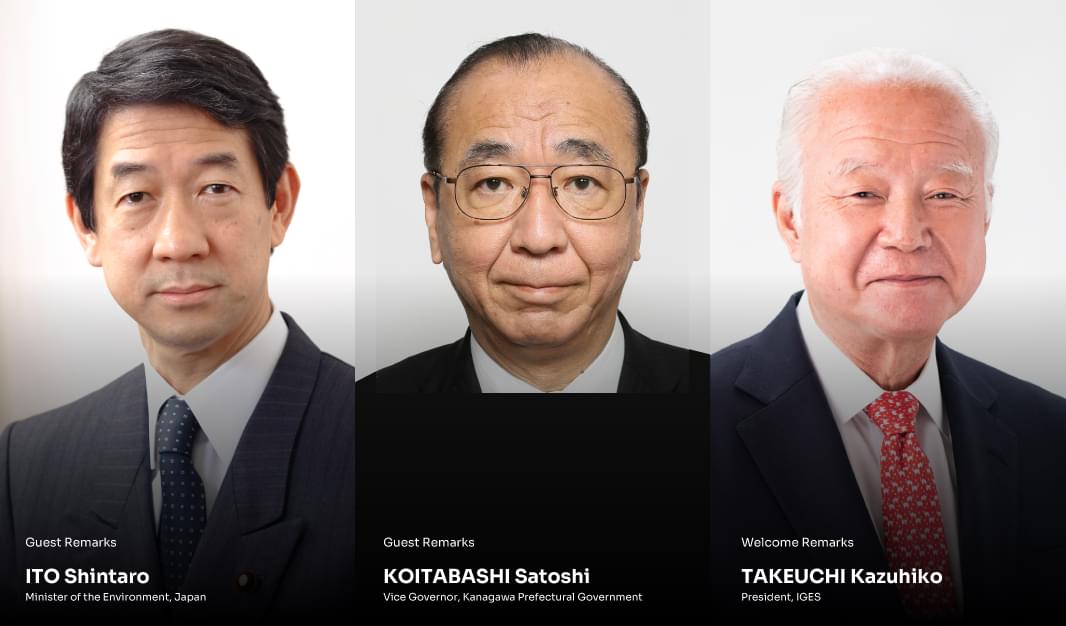




ITO Shintaro, Minister of the Environment, Japan, opened his speech referring to Japan’s participation in the 28th Conference of the Parties (COP28) of the United Nations Framework Convention on Climate Change (UNFCCC) and sharing his view that significant progress had been made, including an agreement on a loss and damage fund at the beginning of the conference, and the conclusion of the first global stocktake (GST) under the Paris Agreement.
He noted that Japan had led the negotiations on formulating rules under Article 6 of the Paris Agreement and had implemented many emission reduction projects through the joint crediting system (JCM), which would lead to the Asian Zero Emissions Community concept being promoted by the Government of Japan. He emphasised his determination to contribute to further emission reductions across the world by utilising this experience and providing further support for capacity building and project formation. He mentioned that Japan is currently developing its Sixth Basic Environment Plan and stated that the Regional Circular and Ecological Sphere (Regional-CES), where the environment, economy and society are integrated and localised, is an important pillar of the plan. Finally, he shared his motivation to take further concrete steps to achieve the Regional-CES in the future.
KOITABASHI Satoshi, Vice Governor of Kanagawa Prefecture, began by mentioning that IGES is contributing to the formation of prefectural policies through collaborative projects with Kanagawa Prefecture, such as the “Kanagawa Decarbonization Vision 2050,” which was created in FY2021 through a joint research initiative between the prefecture and IGES. He thanked IGES for making the future vision and action options that prefectural residents, businesses, government, and other actors should aim for to achieve a decarbonised society by 2050.
He then referred to Kanagawa Prefecture’s November 2019 announcement on “Realization of Decarbonized Society by 2050” and its decision in February 2023 to raise its 2030 greenhouse gas emissions reduction target from 46% to 50% below the 2013 level. He stated that the prefecture is working on fully revising the “Kanagawa Prefecture Global Warming Prevention Plan,” to achieve a decarbonised society.
Regarding biodiversity conservation, he shared that Kanagawa Prefecture is also revising the “Kanagawa Biodiversity Plan” to develop a nature-positive economy, which is also a national policy.
Finally, he expressed the hope that IGES would provide suggestions for Kanagawa Prefecture to address achieving a decarbonised society and biodiversity conservation through an integrated approach.
IGES President TAKEUCHI Kazuhiko first stated that this year’s ISAP is going to be held under the main theme “Accelerating Sustainability Transitions in Asia and the Pacific: The Transformative Potential of Integration, Inclusion and Localisation,” sharing some of IGES’ recent contributions to international processes including COP28, which was successfully convened just prior to ISAP2023.
He then introduced the “Paris Agreement Article 6 Implementation Partnership Centre,” established by the Ministry of Environment, Japan (MOEJ) at the 2023 G7 Sapporo Ministers’ Meeting on Climate, Energy and Environment, which was welcomed by G7 countries. He reported that IGES, as the Centre’s secretariat, was cooperating with the UNFCCC Secretariat and the World Bank to support capacity building in countries involved in implementing Article 6.
He stated that MOEJ and IGES are deeply involved in the initiative on synergies between climate change and the Sustainable Development Goals (SDGs), launched by the UN Department of Economic and Social Affairs (UNDESA) and the UNFCCC Secretariat. He announced that the Expert Group on Synergies between Climate Change and SDGs, in which he participates, will release a second synergies report in 2024. IGES will organise an expert meeting on this in collaboration with MOEJ.
He concluded by remarking that this year’s ISAP is strengthening its commitment to the next generation, including a review of the forum with youth participants in the closing session. He also drew the audience’s attention to the participation of students at this year’s ISAP poster session.

-min.JPG)
-min.JPG)
-min.JPG)
-min.JPG)
-min.JPG)
-min.JPG)
ISAP Poster Session
At this year's ISAP, a poster session will be held in the space in front of the elevators on the 5th floor of the main venue, Pacifico Yokohama. The poster session is a common presentation format at international conferences and academic meetings, where researchers display posters introducing their research and activities and explain them directly to those who are interested or stop by.
In addition to the topics covered at ISAP meetings, IGES is engaged in a wide variety of research and activities. You will have the opportunity to discuss these diverse projects directly with our researchers. The poster session is also a great opportunity for researchers to gain new insights from the questions they receive and to connect with others who are conducting similar research. Please feel free to talk to the poster presenters when you visit the venue. We hope you will enjoy catching up on conversations that are unique to the poster session and different from the seminars where you listen to presentations from the stage.
In addition, as a special programme, junior high and high school students who are interested in biology and science will participate in the poster session as presenters, so please keep an eye out for these young researchers who will present their research side-by-side with IGES researchers.
Registration